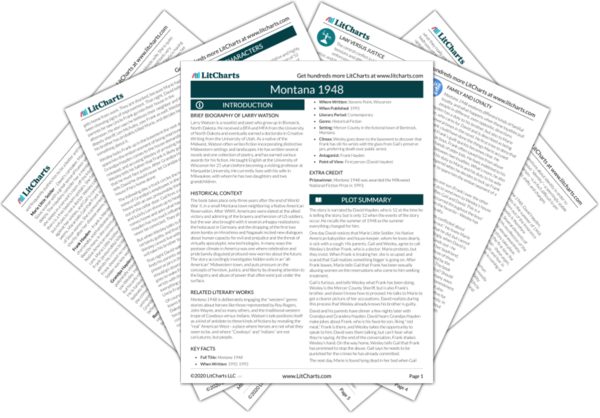Summary
Analysis
In December of 1948 David’s family moves away from Bentrock. Frank’s death has been explained away as an accident, and the coroner (the only other person who saw Frank’s injuries) has kept the Hayden’s secret. His crimes were also kept secret—Wesley noted this was for the best, as Frank had never been proven guilty in a court of law. Wesley and Grandpa Hayden did not speak to each other at the funeral, nor after. Wesley agreed with Gail that he should resign from his post, and they put the house up for sale. Wesley then took a new job in Fargo, North Dakota. David tells his friends he is only going away temporarily, and that he will be back the following summer.
Far from everything “returning to normal” as David thought it would, Frank’s death changes everything. Frank died, but justice was not pursued, and new secrets are added to the long list of old ones. The family cannot talk about Frank’s crimes or about the actual nature of his death. Wesley, utterly separated from his father, finally moves away from Bentrock and leaves his post as sheriff behind as well, practicing law as Gail always wanted him to. Wesley has his new identity. David, who can’t or doesn’t want to understand the permanence of this change, tells his friends he will be back by summer.
Themes
As they drive away from the house, David tells his parents to wait and jumps out of the car. He runs up a snowdrift to look at his house. It looks dark and empty. He looks back at his parents and wishes he could live away from them and their sadness.
The rest of David’s life has not gone poorly. His father got a job as a lawyer, much to his mother’s happiness, and David himself eventually becomes a history teacher. He is intrigued by how any history likely conceals stories of sexual abuse, murder, or suicide. Though he tells his students that these texts tell the whole truth, privately he knows that history always contains a cover-up of some kind.
David has enjoyed a good life. David’s profession of choice (a history teacher) reveals his adult understanding of these events: he knows his experience was not an entirely unusual one. He knows there are many families like his, with secrets. The events of the summer of 1948 taught him a valuable lesson about the difference between the way things seem and the way they are, between the history you read and the actual history.
Themes
Len and Grandpa Hayden have both died of strokes—David wonders if the strokes were caused by their keeping the secret of Uncle Frank for so long. He thinks his own father’s cancer is also a result of guilt.
David notes that the men who kept Frank’s secrets have all died, and perhaps the stress and guilt of keeping quiet had something to do with their deaths. David, in his adulthood, is capable of understanding how taxing it must have been to keep this information quiet.
Themes
Get the entire Montana 1948 LitChart as a printable PDF.

One memory of Marie has stuck with David after 40 years. He, Marie, and Ronnie had been playing football in the yard, and he remembers thinking of them as his real family, a family that didn’t rely on blood or birthright, and one that accepted him for who he was.
Adult David is also someone who has figured out his own definition of “family.” He remembers Marie and Ronnie now as members of a “real” family. He has figured out what “real family” means to him—it is one structured around love and acceptance—and he has restructured his memories accordingly.
Themes
David’s wife, Betsy, is fascinated by David’s story of what happened in the summer of 1948. One night at dinner, when David’s parents are still alive, she brings it up, lightly commenting, “that sure was the Wild West, wasn’t it?” Wesley responds angrily, slamming his hand on the table and saying “Don’t blame Montana! Don’t ever blame Montana!” Later that night, David sits in his father’s seat at the table, and puts his hand on the tabletop. He believes he can still feel the wood vibrating from his father’s blow.
The novella ends with this brief account in order to underscore one of its most powerful messages: that we too often simplify the past according to clichés and stereotypes. Betsy is willing to chalk the events of that summer up to the “Wild West”—Wesley vehemently rejects this impulse. “Blaming Montana” distracts from the real problem: moral weakness, systemic racism, blind devotion to family or the status quo or public opinion: these are enduring American problems, the novella argues, not simply relics of the “Wild West.”
Themes












